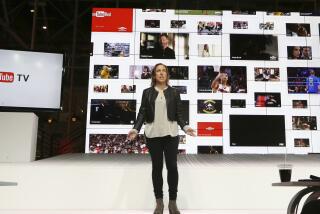‘The Internship,’ now starring ... Google
- Share via
Vince Vaughn and Owen Wilson may be the big names in the new comedy “The Internship,” but the real star of the film is Google.
The company campus in Mountain View, Calif., is the setting for the movie in which Vaughn and Wilson play down-on-their-luck watch salesmen searching for a second chance as Silicon Valley interns.
Google lent its brand to the 20th Century Fox movie and let the production film two days on-site without charging location or licensing fees.
PHOTOS: Hollywood backlot moments
Brainy staffers took on roles as extras (co-founder Sergey Brin appears twice, once wearing green neon slippers and riding an elliptical bike). The film highlights Google’s Gmail, Google Plus, Wallet and Maps, and the company’s self-driving car gets a cameo too.
Google helped the filmmakers reconstruct the company’s campus for filming at Georgia Tech in Atlanta, down to the details such as the T-shirts employees wear and the colorful “Noogler” propeller hats that interns wear during their first week. Google’s creative team designed the movie’s end credits. Google even contributed dialogue for two scenes.
The film comes as Google’s do-no-evil corporate image is under scrutiny from government regulators and privacy watchdogs, who question whether the technology giant’s business practices harm consumers and competitors.
“If the movie can convey a spirit of openness and fairness, of connecting the world and doing no evil, then it is going to be very positive for Google’s image,” said Peter Sealey, adjunct professor of marketing at Claremont Graduate University. “Google needs that now. This movie could help keep them out of the penalty box a little while longer.”
PHOTOS: Celebrities by The Times
Vaughn, who first approached Google, and director Shawn Levy insist that “The Internship,” which opens June 7, is not a two-hour commercial for the technology giant. Google did have approval over how its products and culture were represented in the film, but it did not have final cut. The company gave filmmakers only notes about technical details in the movie, Levy said, and Google did not contribute to “The Internship’s” $58-million budget.
Wheeler Winston Dixon, a film studies professor at the University of Nebraska-Lincoln, called “The Internship” an “epic piece of branding” for Google. “To have an entire film tent-poled around one company takes product placement to a whole new level,” he said.
“The Internship” continues a warming of ties between Google and Hollywood after years in which the two have clashed over piracy issues; Fox was the last major studio to agree to distribute its movies through Google Play. The relationship has begun to evolve from mutual suspicion to mutual interest, and building a film around a company that has become a fixture in popular culture may help the studio sell tickets.
“I do believe there is an increasing recognition of how to coexist and, in fact, help each other,” said Levy.
Google executives cast their motivations in much simpler terms. The film, they say, is a way to encourage kids to fall in love with math and science and pursue careers in technology.
“The reason we got involved with the movie ‘The Internship’ is that computer science has a marketing problem,” Google Chief Executive Larry Page said during a keynote speech last week at the company’s annual developers’ conference in San Francisco. “We’re the nerdy curmudgeons.”
Vaughn came up with concept for the comedy when the recession hit and friends in the Midwest began losing their jobs. As he began sketching out the story, he hit on the idea of having two salesmen reinvent themselves at the company that has come to symbolize the new economy.
“If you were to start over, that would be the great place to go,” Vaughn said. After completing a draft of the script, he requested a meeting with Google in April 2011.
“We’re quite used to the phone ringing and people asking to work with us,” Google Chief Marketing Officer Lorraine Twohill said. “We do a lot of creative collaboration. But this is clearly a whole different scale.”
Vaughn and Wilson toured Google’s headquarters and laid out the premise for “The Internship.” The notion that Google, which hires 1,500 summer interns from a pool of 40,000-plus highly qualified candidates, would give a shot to two goofy washouts broke the ice.
“We all started laughing,” Twohill recalled.
Films about companies don’t always work out the way their image handlers might hope. Producer Scott Rudin approached Facebook about participating in the 2010 film “The Social Network” but said he walked away because the company made too many creative demands. The movie won three Oscars, but Facebook founder Mark Zuckerberg was portrayed in an unflattering light.
Vaughn and Levy said they won Google over with a commitment to cast Google in the film essentially the way Google sees itself. Levy made a series of subsequent trips to Google in spring and early summer last year, meeting with Google employees and exploring the campus. He attended training for summer interns.
PHOTOS: The 20 best companies for interns
Levy, Vaughn and screenwriter Jared Stern say they were given wide latitude to interpret freely. Levy also promised that the PG-13 comedy, though irreverent and occasionally crass, would retain the warmth, humor and optimism of some of his other films, including “Night at the Museum” and “Cheaper by the Dozen.”
“This was opportunity to take a lens inside of a culture that is globally ubiquitous but largely mysterious,” said Levy. “Everyone knows Google, but no one knows what it would be like to work at Google.”
The film showcases the famous perks that Google’s rich profit margins make possible: free gourmet food and dry cleaning, nap pods for afternoon shut-eye, lap pools and volleyball courts.
In the script-writing phase, the company furnished “tech-speak notes” to lend authenticity to conversations between company interns. The filmmakers gave one tireless employee, played by Rose Byrne, a line that underscores the corporate philosophy of “Googleyness,” a combination of intellectual curiosity and a passion to change the world.
“I actually believe,” Byrne tells Wilson’s mystified newcomer, “that what we do here helps make people’s lives a little bit better.”
“It wasn’t a shallow comedy, it was a comedy with heart — that was very important,” said Twohill. “It captured our spirit, or ‘Googleyness.’ They built a lot of trust with us.”
PHOTOS: Google Doodles of 2013
Companies are increasingly leaping from the background in films into story lines and dialogue, said Sut Jhally, professor of communication at the University of Massachusetts at Amherst. “The Internship,” he said, is just a step beyond what Levy did in “Night at the Museum,” in which the American Museum of Natural History starred alongside Ben Stiller. “You don’t have to do direct product placement anymore. ... The whole environment of the film is Google.”
Vaughn says Google’s driverless car and other products lent authenticity and aided in storytelling: They heralded the characters’ entry into an unfamiliar world, much like the horse of a different color signaled Dorothy’s arrival in Emerald City in “The Wizard of Oz.”
Even though Google is happy with its portrayal, Jason Squire, an associate professor at the USC School of Cinematic Arts, said the film is still a risk — it could bomb at the box office or rub people the wrong way. “It’s a very daring thing,” he said. “It could easily backfire.”
There were a few ideas that Google pushed back on, said Aasif Mandvi, who plays Roger Chetty, the gruff head of Google’s internship program. For example, filmmakers had originally wanted the self-driving car to spin out of control and crash. “I think Google was like, ‘No, we’re not going to do that because we haven’t even launched the driverless car yet,’” Mandvi said. “I don’t think they wanted to show it in a way that was not favorable.”
Twohill said she resisted the urge to meddle with other less flattering parts of the film that distort reality for comedic effect, such as the sometimes harsh treatment of interns (the program is referred to as “mental ‘Hunger Games’”). Or one ribald “team building” excursion to a San Francisco strip club.
“We were a little bit worried about the dance club scene, to be honest,” said Twohill, who watched the film with company founders Page and Brin. “I knew what was coming, they didn’t.”
Asked Page and Brin’s reaction, Twohill laughed. “I’m still here,” she said.
Oliver Gettell contributed to this report.
More to Read
Only good movies
Get the Indie Focus newsletter, Mark Olsen's weekly guide to the world of cinema.
You may occasionally receive promotional content from the Los Angeles Times.










